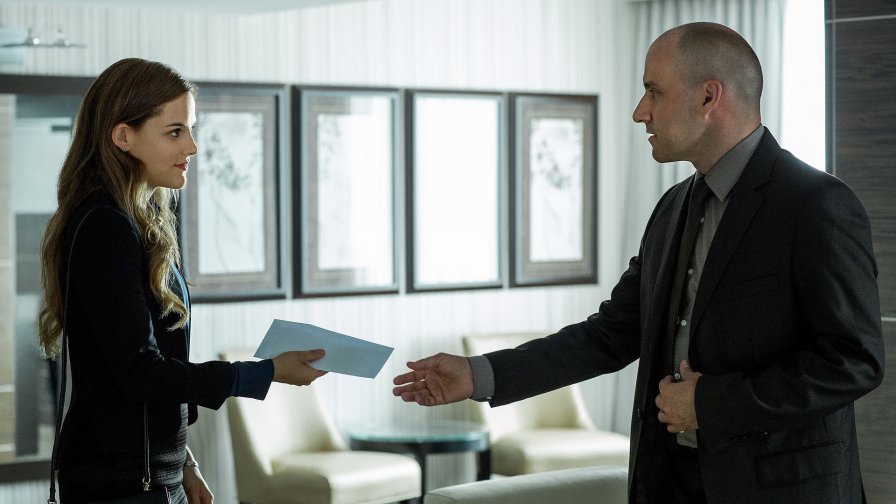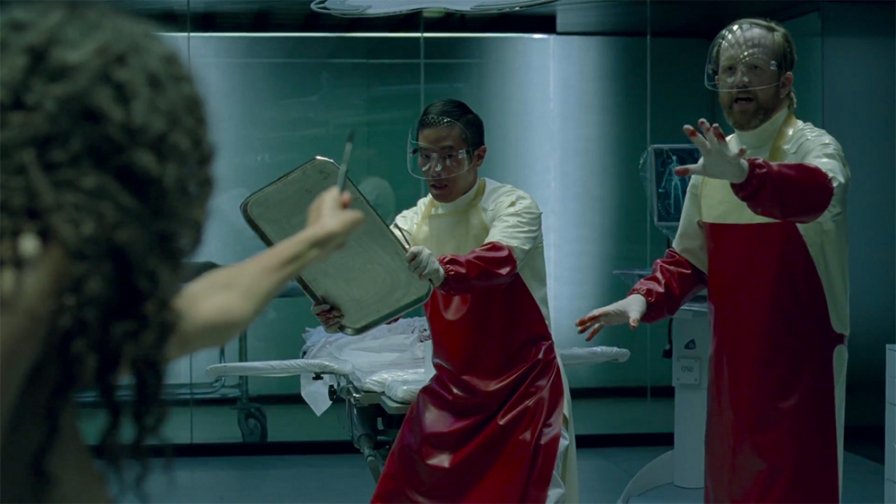Welcome to Screen Week! Join us as we explore the films, TV shows, and video games that kept us staring at screens. More from this series
05
Mr. Robot
Created by: Sam Esmail
[USA]

For a show with a narrator as unreliable as the stories told by its corporate villains, it’s amazing how Mr. Robot managed to sharpen its critical attacks this season. Harboring all the twists and turns expected of high-profile dramas, Mr. Robot ramped up the cautionary tales for progressive and insurgent movements, propping up political allegories and cultural corollaries to our own fucked-up world while blurring the fictitious with our contemporary moment via E Corp, Enron, Dark Army, Occupy, fsociety, Anonymous, Snowden, Elliot, etc. Through it all, the show maintained the creeping fervor and horrifying thrust of the first season, the filmic pastiche and quotations this time exaggerated to even more surreal ends through long, hallucinatory sequences favoring kineticism over plot. This season’s masterstroke, however, was to zoom out of the corporate paranoia and highlight, both on the show and in our own lives, the global oppression and exploitation also imposed by state violence, conflating the spheres of capital and the state in complex, multifaceted ways. Here, the show sought to temper the frailties of the human condition with the revolutionary possibilities of technology, couching the personal-is-political (the parents of the show’s protagonists, Elliot and Angela, were victims of a chemical spill — sound familiar?) with broad messages about mental health, accountability, rhetoric, and mediations to power. Mr. Robot is simply the most critical, high-stakes show on TV, aimed brilliantly at those who, as Elliot put it, play God without permission.
04
Game of Thrones
Created by: David Benioff & D.B. Weiss
[HBO]

Our time in Westeros is running short: in 2016, showrunners announced that there will be just two more seasons of everyone’s favorite family-friendly fantasy drama (just kidding, don’t let young children watch Game of Thrones). The antepenultimate season perfectly encapsulated what makes GoT great TV: We got answers to some of our long-standing questions, sobbed over the deaths of beloved characters, rejoiced in the comeuppance of hated ones, and cheered for our preferred House in carefully-constructed battles. Sure, there were some misses (the dead silence that Tyrion faces when trying to teach Grey Worm and Missandei how to crack jokes pretty much mirrored exactly what was happening on the other side of the screen), but the massive hits (Dragons! Wildfire! White Walkers! “Hold the door!”) more or less made up for those. And as storylines became intertwined and the ties that bind the main characters became more evident, the various chess pieces that make up the Game of Thrones universe began to fall into place, setting us up for what will surely be two more incredible, history-making seasons of television.
03
Atlanta
Created by: Donald Glover
[FX]

In the embarrassing tradition of rough critical-consensus adjectives ironing out their own usefulness, “peak tv” is now a style. It’s basically a snobby genre, à la “important” or “prestige” film. The draw still boils down to sex, violence, and jobs, but things are generally quieter, slower, and oh so portentous. Despite its crass-slingin’, bro-centric target demo, FX has been an impressive host to the more surprisingly winning content of this sort, and they truly did peak with this perfectly pitched marvel of a show. Donald Glover and his creative team put us in a space that, while utilizing that familiar peak minimalism, structurally surprised without ever losing its lithe tonal refinement. This first season clicked as misadventures loaded with biting satire, but enraptured with intricate, loving human detail. Earn, Van, Darius, and Paper Boi all left indelible, endearing impressions, and the secondary characters, often their quarry, were nonetheless shrewdly observed. Claims of the “cinematic” in TV are often overblown, but Atlanta’s transportive, just-this-side-of-dreamy direction frames its deft social critique/character study in such a seamless way that it feels like the most expansive visual storytelling in years, peak or plummet.
02
The Girlfriend Experience
Created by: Lodge Kerrigan & Amy Seimetz
[Starz]

Women’s work necessarily balances — between eggshells — tradition and meek innovation. Quilting is variation stitched together by sameness; blowjobs, sameness punctuated by variation. Throughout The Girlfriend Experience, these binary codes play out in gloriously narrow fashion. Directors/Writers Amy Seimetz and Lodge Kerrigan take an entire aesthetic whole from Steven Soderbergh’s 2009 film of the same name — unrelentingly voyeuristic distance shots of interiors and the buzzing of office lights — but use their half-hour TV series format to foreground the redundantly transactional nature of sex work in ways impossible for cinema’s slant toward spectacle. As student/law firm intern/sex worker Christine Reade, Riley Keough (who also killed it in her supporting role in this year’s American Honey) likewise lit up the screen in the most boring of ways, showing just how staid fucking for money — at least on the selling end — can be. The narrative arc follows the thoughtful, meticulous acquisition of dollars, not the predictably erratic pattern of seduction or cumming, as Reade successfully navigates yachts, expensive hotel rooms, abandoned mansions, and the men who own them: she’s good, we gather, at her work (wink wink), but more skilled as the manager of her business slash self (solemn nod). Despite — or yes, because of — being one of the most explicit shows of the year, The Girlfriend Experience was no empty pantsuit, deploying sex-as-formalism to hold its own against 2016’s most vexing debates around gender and power.
01
Westworld
Created by: Jonathan Nolan & Lisa Joy
[HBO]

“Cultural phenomenon” is hardly the first descriptor to spring to mind when one thinks about the original 1973 Westworld film. Michael Crichton’s campy exploration of an android takeover of a Western amusement park remained largely forgotten outside cult circles. Similar to countless other outlandish cinematic experiments from the 1970s, Westworld was mostly remembered as yet another oddity of unfulfilled potential rather than as a forgotten flawed masterpiece. HBO-induced revisionism may now change this perception, however.
It came as a surprise to many when HBO announced it was in the process of producing a Westworld TV show. Late-night TV nostalgia had still left fond distant memories of the original film, and the hype train was soon boarded, especially after the first released teasers and cast announcement (Anthony Hopkins, Ed Harris, and Evan Rachel Wood have all given career-defining performances this season). Crichton’s original concept remains fascinating, but not only was the original film terribly outdated, the few spin-offs from the original story were either underwhelming or straight-up silly (a 1978 sequel titled Futureworld and a 1980 short-lived TV show with only three episodes aired before cancellation).
Jonathan Nolan and Lisa Joy’s Westworld, however, is a different beast entirely. An elegantly ambitious work, it was as painstakingly fashioned as an intricate puzzle game, which led to a richly interactive communal experience with its viewer base. Contrary to the binge-watching phenomenon, Westworld made a strong case for the seemingly outdated weekly TV show format, wherein every week spectators would endlessly debate new theories or further illuminate old ones. This format worked so well because, unlike shows that prompt similar viewer experiences with wild speculation (Lost, Game of Thrones), Westworld actually provided narrative material and imagery to support fan theories. Parallel to the robots seeking to escape their programmed slavery, the pieces were there all along for us to assemble. The maze, the holy elixir of conscious life constantly referenced throughout the season, exists both for the hosts and for the spectators.
Among the many noticeable and important changes from the source material is the terminology. The robots in the park are called “hosts” in HBO’s Westworld, a much more fitting term for the repetitive and excruciating humanization process that the machines must undergo before offering a truer-than-life experience to the park guests. Repetition plays a central role in Westworld’s narrative, as well as in the hosts themselves. While they experience their lives within their predetermined narrative loops, the audience witnesses numerous apparently duplicate scenes, in which each new repetition reinforces an evolving meta-narrative. At every break of dawn, the hosts’ programmed AI narrative determines their personal stories, how they should behave, feel, and perform. In spite of all their technological complexity, however, their ultimate objective in artificial life is painfully mundane and exasperating: to fulfill the fantasies of the human guests, which, as human fantasies often go, are grounded in the immediate satisfactions and pleasures of violence and lust. Violent delights have violent ends: a recurrent prophetic statement in Westworld (and a nod Shakespeare’s Romeo and Juliet) that signals the ultimate price we must pay for our egoistical, anthropocentric search for gratification by way of reckless eroticized violence.
There is something God-like in creating a fictional character, and Robert Ford (Anthony Hopkins), the park’s larger-than-life mastermind, certainly appears to derive sadistic pleasure from creating pain out of nothing, watching his hosts eternally endure whatever tragedy his personal whims dictate. Ford’s obscure personal vision even inspired think pieces on the ethics of artificially constructed pain. Roxa Luxemburg once said that those who do not move, do not notice their chains, and ultimately, in a somber twist of events, continuous incessant pain becomes the only path for the hosts to perceive their condition, to regain class consciousness and overtake the means of their own production. But the enduring question remains: to what and where can they ever actually hope to break away to? The loop becomes static, the story eternal, their fates shackled.
Season 1 left us with many unanswered questions (and sadly season 2 is scheduled to return in 2018). Westworld, however, does leave a defining mark in a year that witnessed a slant toward the experimental in TV (another significant example was the flawed, yet deeply enthralling The OA). We are going to repeat it all again this year, no doubt, yet something has been broken away. Our loops slightly changed. And we owe much of this to the sacrificial pain of the hosts of Westworld.
Welcome to Screen Week! Join us as we explore the films, TV shows, and video games that kept us staring at screens. More from this series
